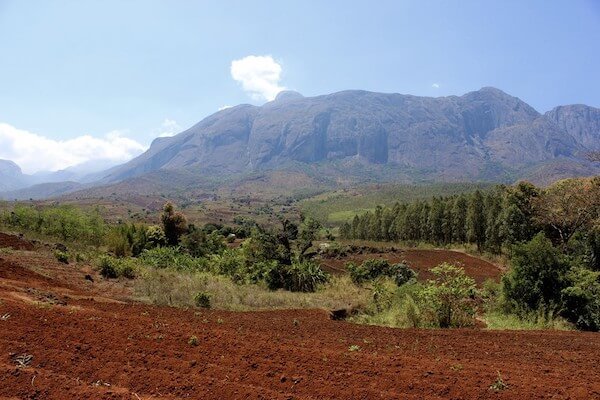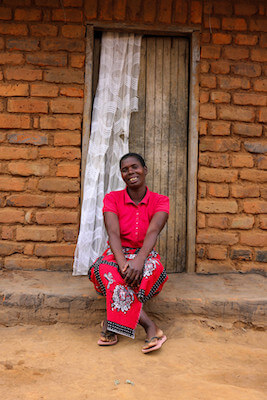In the capital city of Lilongwe, Malawi, there is an airport. Flights arrive, day in and day out, from across Africa and around the world. You can leave your home in Chicago or Seattle or Dallas or Washington DC, and after 25, or 38, or 41 hours—there is no fast way to get there—you would arrive in Malawi, a small, landlocked country in southeast Africa.
Upon leaving the airport, you start driving south and quickly realize that the “city” of Lilongwe is not a city as you might have imagined it. It’s green and feels almost rural—no real “downtown” and only a handful of tall buildings. There isn’t much traffic. And rolling electricity outages shut off the power when the grid is hyperextended, even here in the capital.
You keep driving and soon find yourself surrounded by villages. The paved roads turn quickly to dirt, and the urban cement homes and offices shift to clay and thatch. There are extremely limited economic opportunities outside of agriculture, so many families live here, harvesting crops, and working tirelessly to support themselves and create a better future for their children.
Keep driving.

Now you’re in the rural heart of Malawi, away from the few resources shared by its 19 million residents—a population that is expected to double in the next 15 years. You park, and step out onto the red dirt that will immediately stain your shoes. And start walking. Up a hill, fighting to keep your balance, over the ridge where it might, at first, feels like the world ends.
There, you could come across a small structure pieced together from recycling and earth. Inside, a family. Kids playing and laughing, just like kids everywhere. A mother stirring a pot on an open flame, hoping that she has enough calories to make it through another day. They don’t have their own crops. They don’t have running water. They don’t have electricity. The kids do not go to school.
This is a family living in the most severe form of economic poverty—a condition called ultra-poverty. And this is the kind of family that Opportunity Malawi is working to serve.
Poverty in Malawi
Malawi is one of the poorest countries in the world, with over half of the population living in poverty. Nearly 80% of people rely on agriculture to survive, and the country is at risk of natural disasters and climate shocks that could decimate a season’s harvest. In addition, Malawi is landlocked, limiting access to ports, easy transportation, and the rest of the world.
The COVID-19 pandemic slammed the economy in Malawi, spiking inflation, exchange rates, and national debt. In the midst of these macrotrends, families continued to do what they have always done: grow crops, build small businesses, keep trying to put food on the table.
But it’s not easy. Over a million people in Malawi are food insecure, a condition where their immediate livelihoods are at risk because of hunger.
The precarious situation of ultra-poverty
Here at Opportunity International, we regularly talk about extreme poverty—the condition of living on less than $1.90/day. But this group of about 700 million people does not all look the same.
There are those who have fallen into extreme poverty for a season but have a plan to rebuild their savings. There are those who have been living in extreme poverty for generations, but thanks to a new business or a shift in the local economy, are about to take bold steps forward. There are those who do not know what to do—they feel trapped and resigned to a life they didn’t choose.
And then there are those at the very bottom of the economic pyramid. Those living not just on less than $1.90/day, but less than $0.50/day. Those who, as development economist Edita Vokral said, “have too little food to live, but too much to die.”
Vokral went on to describe ultra-poverty further, “The person does not have social networks, which could help her to get out this situation of need, and little emotional support to find the energy to fight to get out of the situation of despair and mere survival.”
Technically, the condition of ultra-poverty is often defined as eating below 80% of someone’s energy requirements despite spending at least 80% of their income on food. Most of those living in this condition are landless rural women who cannot reach even the lowest rung of the economic ladder.
Many of these women live in Malawi.
How can we address this enormous challenge?
Ultra-poverty is a multidimensional problem. It’s an economic situation, yes, but it’s also poverty of connection, of training, of understanding, of spirit. It’s being alive without really living.
As such, it requires a multidimensional solution. And over the years, Opportunity International has introduced a number of programs and initiatives to address the unique needs of rural families in Malawi and around the world.
Agriculture Finance
Opportunity’s Agriculture Finance program helps small-scale farmers transform their plots into more productive and lucrative enterprises. Through training, specialized loans for farmers, and connections to the broader value chain—everything from seed and fertilizer suppliers to processing plants—the AgFinance program has been remarkably successful at helping smallholder farmers grow more effectively.
In Malawi, where the vast majority of people are farmers, these services have been essential. We have big plans to continue to scale AgFinance in Malawi and across sub-Saharan Africa.
But Agriculture Finance only works for those that already have something to farm. You don’t need a big plot or many crops, but you do need something—and for those in ultra-poverty, that something just might not exist.
So how do we get them involved?
The Graduation Model
Originally developed by BRAC more than a decade ago, the Graduation Model is designed to help those living in the most severe forms of poverty take a step forward. Opportunity International began piloting a Graduation Model in Malawi in 2021.
In theory, the program is simple: First, we identify the families most in need of support. These are the families beyond the ridge, the ones whose only daily goal is to survive. We give them $20/month for six months which they can use to buy food. Typically, these families spend almost all of their day looking for food, so covering that cost gives them a rare and valuable commodity: time.
With this gift of time, participants are expected to start a business—with a significant amount of support from the Opportunity team. We provide an asset—something like a goat or a sewing machine—that they can use to generate a sustainable income, and we connect them with a caseworker who provides a huge range of training. These staff members teach participants how to start their businesses, but they also lead sessions on life skills like hygiene, nutrition, confidence, and community inclusion.
Finally, every participant will be part of a savings group so that they can begin saving—and be surrounded by peers who are taking the same bold steps they are.
Over the course of 24 months, participants will meet, learn, and build together. Upon “graduation,” the hope is that they are equipped to work and support themselves. They will have built up a small amount of savings (maybe $100), and they will have assets that generate a sustainable income. Put simply, upon completing the program, they will be able to start a better future.
Shalom Training
In addition to piloting the Graduation Model in Malawi, we are also aware that the ramifications of multifaceted poverty extend far beyond a family’s ability to earn an income. Poverty is so often mental, emotional, communal, and spiritual, too. In response, Opportunity developed Shalom training—conversation-based sessions hosted at existing Trust Group or farmers’ association meetings that are designed to facilitate harmonious, multidimensional relationships.
This faith-based series offers a biblical vision for joyful well-being marked by flourishing relationships with God, self, others, and creation. It’s yet another way that Opportunity International is meeting clients where they are, designing programs and initiatives to address the challenges they face.
The next time you land in Lilongwe, you could retrace your steps. You drive through the city, growing fast. Past the dirt roads where smiling kids laugh and chase the car as you drive by. Up the hill where you park and walk over the ridge again.
This time, you see the mother and she has hope in her eyes. Her progress is slow, but it is steady—and now she has five goats tied up out front. She waves. Later this afternoon, she’ll gather with her neighbors—people just like her who are taking their own careful steps forward.
A year from now, she might join an agriculture co-op. Or a Trust Group. She’ll save to enroll her kids in school. She’ll repair her roof.
One day at a time, she is graduating from ultra-poverty. And she is just getting started.


